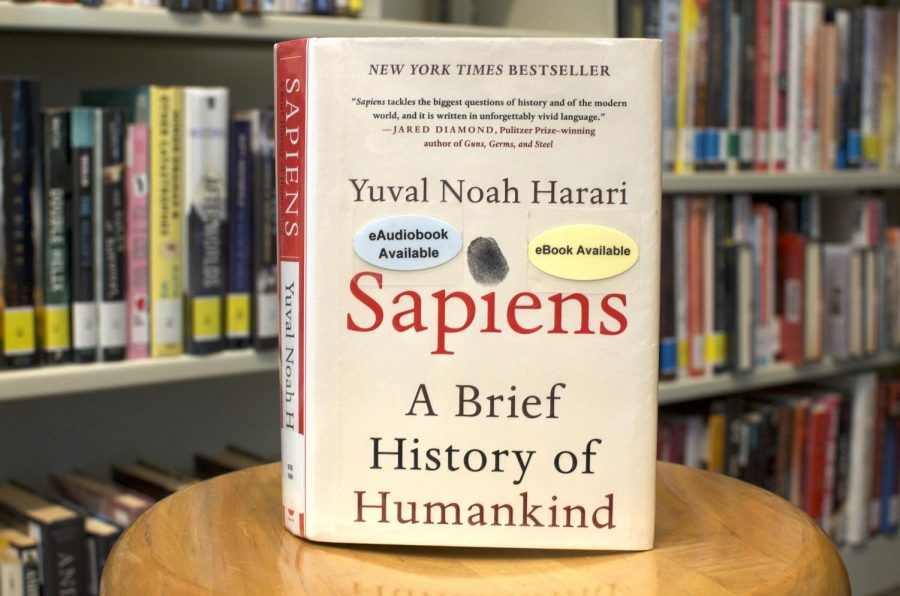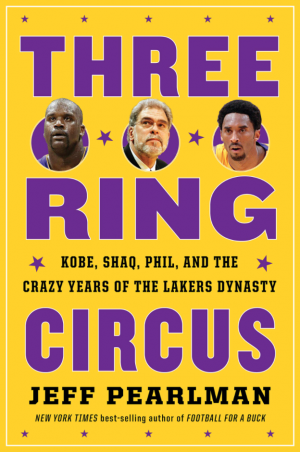Book Corner: The rise of humankind
How did humans come to be so powerful, and where is this power taking us?
“Sapiens: A Brief History of Humankind” is a 390 page nonfiction written by Yuval Noah Harari that was first published in 2011. Harari is also the author of “Homo Deus” and “21 Lessons for the 21st Century.”
September 13, 2021
Arely’s ranking: ★★★★★
Ever wondered why your body allows you to down an entire tub of ice cream in one sitting? Or how money, the root of modern tribulations, came into existence? I never put much thought into such simple questions until I read “Sapiens: A Brief History of Humankind,” which tackles each of these questions with satisfying answers and gave me a new perspective on mundane habits and activities.
In just over 400 pages, author Yuval Noah Harari masterfully crafts the story of humankind from the advent of walking monkeys to the vast power we as a species hold today. “Sapiens” explores how ordinary mammals became the most dominant species in the world and are even beginning to rewrite nature. The novel unfolds in several stages, illustrating a series of vast changes humans have undergone such as the thousand-year-old agricultural revolution.
Despite its human-centric title, this book also explores the severe impact of our actions on the environment around us. With the domestication of animals, we humans began to see ourselves as superior beings, and with the Industrial Revolution, we began to harness any “cheap and abundant” energy available to increase productivity, oblivious to the consequences until recently.
Upon selecting the book, I did not expect to emerge from its pages enlightened, yet I ended up learning a plethora of new information I had no idea I needed to know. For example, did you know that the farming of cereals such as grain and rice was humanity’s biggest fraud? As it turns out, according to Harari in Chapter 5, wheat “domesticated” us – not the other way around – forcing us to labor long, hard hours for a food lower in nutrition than easily available forest plants. However, cereal farming allowed humans to sustain larger populations albeit with a worsened quality of life.
Beyond physical developments, Harari investigates abstract changes such as religion, how Sapiens’ social skills set us above Neanderthals and the development of currency, which was one of my main takeaways from the book. Money establishes itself on a framework of mutual trust, and this mutual trust has prompted us to accept the value of green slips of paper and even simple numbers on a screen.
The ending of “Sapiens” left me in shock: Harari lays out a series of novel scientific developments and modern technological advancements that could have immense implications for the future of science as well as society. These advancements would have seemed godlike to our ancestors as humans are beginning to rewrite the fundamentals of nature and human desire, a terrifying concept to imagine, and something that is already crafting a drastically different world. Now that humans can bioengineer organisms from their appearance to their mental state, where will technology lead us?
“The only thing we can try to do is to influence the direction scientists are taking,” Harari wrote.“But since we might soon be able to engineer our desires too, the real question facing us is not ‘What do we want to become?’, but ‘What do we want?’ Those who are not spooked by the question probably haven’t given it enough thought.”
I, who was first recommended the book by my sister, would definitely recommend this book to any student or any person in general. After reading, I saw the physical worthlessness of a flimsy dollar bill, imagined an ape devouring figs as I chomped on Oreos, pondered the meaning of science in biology class—has this happened with any other book? Harari’s incredible storytelling abilities, witty writing style and engaging anecdotes make “Sapiens” a far cry from your average dry history textbook, so don’t be turned away by its hefty length or its historical basis.
As residents of Silicon Valley, the home of several forerunning tech companies, we must recognize the potentially ominous outcomes of unlimited, unethical scientific advancements as well as the importance of equity in this new progress. ”Sapiens” evaluates social issues that continue to play a large role in today’s world and uses biological reasoning as proof for equality. Harari debunks racism, homophobia and other forms of discrimination with sounding proof, making “Sapiens” effective not only for learning facts but also real-world education we can apply to improve our futures.
For those who enjoyed “Sapiens: A Brief History of Humankind,” Arely recommends “A Brief History of Time” by Stephen Hawking, “Hidden Brain” by Shankar Vedantam and “Guns, Germs, and Steel” by Jared Diamond.


















![“[Building nerf blasters] became this outlet of creativity for me that hasn't been matched by anything else. The process [of] making a build complete to your desire is such a painstakingly difficult process, but I've had to learn from [the skills needed from] soldering to proper painting. There's so many different options for everything, if you think about it, it exists. The best part is [that] if it doesn't exist, you can build it yourself," Ishaan Parate said.](https://harkeraquila.com/wp-content/uploads/2022/08/DSC_8149-900x604.jpg)




![“When I came into high school, I was ready to be a follower. But DECA was a game changer for me. It helped me overcome my fear of public speaking, and it's played such a major role in who I've become today. To be able to successfully lead a chapter of 150 students, an officer team and be one of the upperclassmen I once really admired is something I'm [really] proud of,” Anvitha Tummala ('21) said.](https://harkeraquila.com/wp-content/uploads/2021/07/Screen-Shot-2021-07-25-at-9.50.05-AM-900x594.png)







![“I think getting up in the morning and having a sense of purpose [is exciting]. I think without a certain amount of drive, life is kind of obsolete and mundane, and I think having that every single day is what makes each day unique and kind of makes life exciting,” Neymika Jain (12) said.](https://harkeraquila.com/wp-content/uploads/2017/06/Screen-Shot-2017-06-03-at-4.54.16-PM.png)








![“My slogan is ‘slow feet, don’t eat, and I’m hungry.’ You need to run fast to get where you are–you aren't going to get those championships if you aren't fast,” Angel Cervantes (12) said. “I want to do well in school on my tests and in track and win championships for my team. I live by that, [and] I can do that anywhere: in the classroom or on the field.”](https://harkeraquila.com/wp-content/uploads/2018/06/DSC5146-900x601.jpg)
![“[Volleyball has] taught me how to fall correctly, and another thing it taught is that you don’t have to be the best at something to be good at it. If you just hit the ball in a smart way, then it still scores points and you’re good at it. You could be a background player and still make a much bigger impact on the team than you would think,” Anya Gert (’20) said.](https://harkeraquila.com/wp-content/uploads/2020/06/AnnaGert_JinTuan_HoHPhotoEdited-600x900.jpeg)

![“I'm not nearly there yet, but [my confidence has] definitely been getting better since I was pretty shy and timid coming into Harker my freshman year. I know that there's a lot of people that are really confident in what they do, and I really admire them. Everyone's so driven and that has really pushed me to kind of try to find my own place in high school and be more confident,” Alyssa Huang (’20) said.](https://harkeraquila.com/wp-content/uploads/2020/06/AlyssaHuang_EmilyChen_HoHPhoto-900x749.jpeg)











